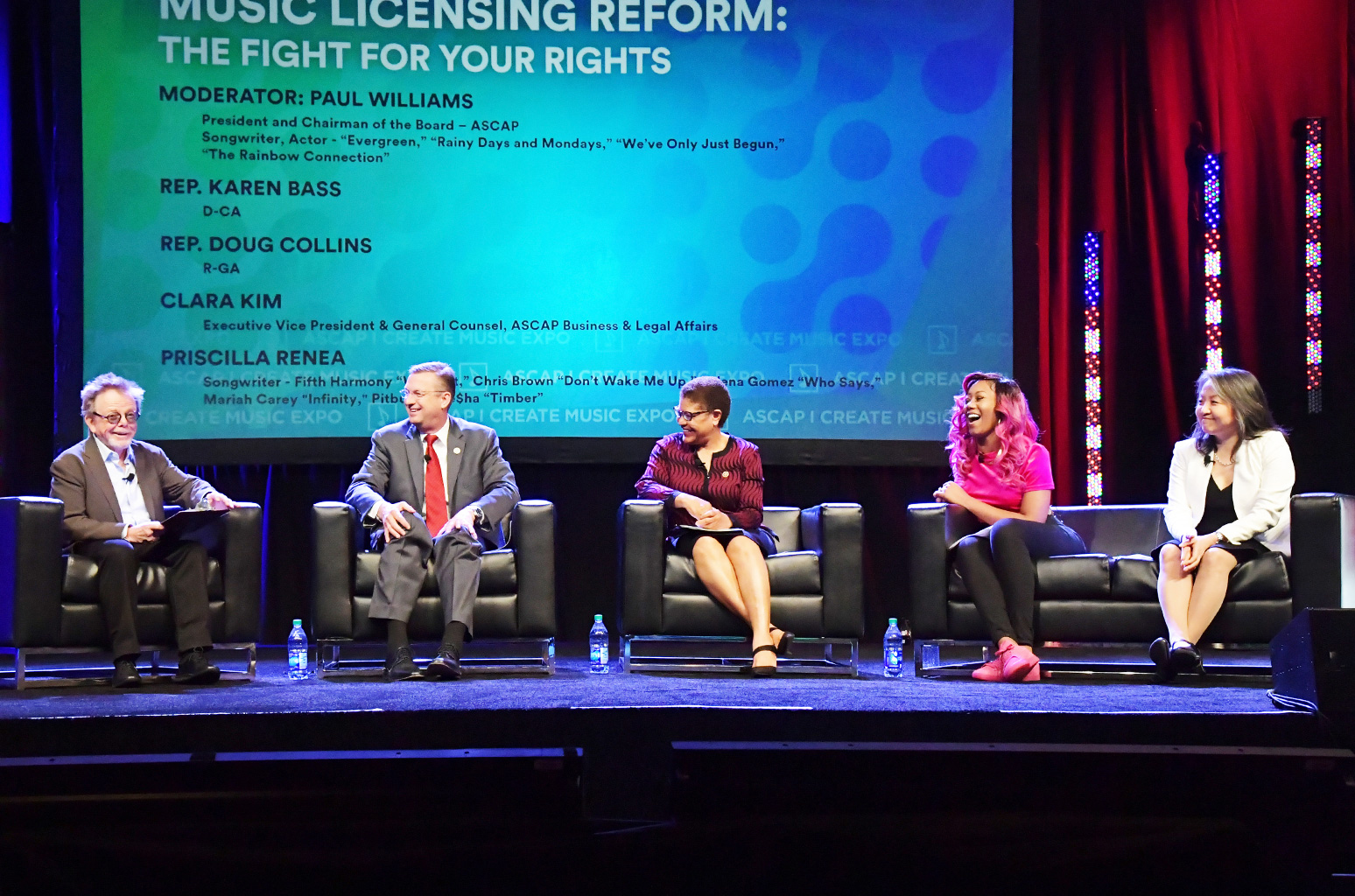
From left: ASCAP president Paul Williams, Representative Doug Collins (R-GA), Representative Karen Bass (D-CA), songwriter Priscilla Renea, ASCAP general counsel Clara Kim (Photo: Lester Cohen/Getty Images)
ASCAP President Paul Williams led a bipartisan effort to to galvanize songwriters in a battle for regulatory reform, while representatives Karen Bass (D-CA) and Doug Collins (R-GA) urged the audience at the April 14 panel discussion “Music Licensing Reform: Fight For Your Rights” to do just that.
“If you’re so passionate about writing your music, and getting it heard, it’s important to use that same voice and same passion to make a difference in your industry as a whole. Because there are industries and people out there who are good folks, but they’re at direct odds with you,” Collins said, speaking at day two of the ASCAP “I Create Music” Expo that ran April 13-15 at the Loews Hollywood Hotel. “They’re benefiting from the system as exists.”
That existing, broken system includes a 76-year-old compulsory license law that sets prescribed rates for songwriters’ work product as opposed to allowing them to negotiate in a free market, and equally arcane “rate courts” in which two federally appointed and life-tenured judges decide rate disputes, often over several years, at a cost of tens of millions of dollars, explained ASCAP general counsel Clara Kim.
Kim explained that while the songwriters were disappointed that the Department of Justice has resisted the changes ASCAP and other music groups have spent the past three or four years fighting for, the DOJ has left the the door open for congress to get involved, “encouraging a comprehensive legislative solution.”
Conceding that it’s very difficult to pass legislation, Kim said that rather than than trying to overturn in one fell swoop the consent decrees that govern music, ASCAP has decided to focus on “two reasonable priorities.” The first would require a the DOJ to periodically review of the consent decrees that govern ASCAP and its competing rights organization, BMI. Enacted 76 years ago, “these laws have not kept pace with marketplace and new technologies,” Kim said. “We believe the government has an obligation to review the consent decrees at least every few years, to justify why they’re necessary and ensure that they’re actually promoting competition – which is their purpose – rather than hindering it.”
Collins — who with Bass sits on the House Judiciary Committee — agreed that a periodic review is basic common sense. “On a simplistic level, we tell everybody to check their fire alarms in their homes every six months. We review everything. Why not come back to something that’s so important?”

ASCAP President Paul Williams hobnobs with house member Karen Bass (Photo: Lester Cohen/Getty Images)
The second priority outlined by Kim was rate court reform. As it stands, songwriters are forced by a “compulsory license” to allow use of their work product, and when the performing rights organizations and the music licensors can’t agree on rates the only recourse is to turn to a one of two federal rate court judges in the southern district of NY. The insular atmosphere, as well as restrictions on evidence, results in a process that “consistently results in rates that we believe are below what the songwriters would get in the free market,” Kim said, noting licensors “have learned how to game the system. They identify which judge they think will give them the better rate, and they bring their disputes to that judge first. That’s not a fair system.”
Education Neccessary
Indeed, the picture painted at the Expo at large, was one of songwriters treated barely better than indentured servants. “There’s no other creative industry – whether films, television, videogames or books – that are decided this way. They’re all decided in the free market. We don’t think music composition should be treated differently,” Kim said.
Priscilla Renae, a singer-songwriter whose work has been covered by Mary J. Blige, Chris Brown and Miranda Lambert, among others, said it’s largely a matter of educating the public “about getting a song from the farm to the table, for lack of a better phrase,” making known that that there is a class of largely invisible artists powering the hits. To which education list Bass and Collins added members of congress.
Bass said one of the things that really helped her was ASCAP taking her on a recording studio tour and walking her step-by-step through the process. While that may be easy for her, since her district is Los Angeles, she suggested the creation of a film that could be exhibited in Washington D.C., for lawmakers to whom the entertainment industry is remote. “Most members of congress don’t deal with this day in and day out like we do on the judiciary committee, and their eyes glaze over,” Collins said. “But if they hear if from you [songwriters], explaining it in terms that make it like a contractor who builds houses, or an accountant dealing with regulations hurting tax returns, that makes it real. Those of you who create the world’s most beautiful lyrics from your minds and hearts and hands, need to explain how these laws affect your business while you’re trying to feed your families like everybody else.”
ASCAP is urging its members to take action by reaching out by contacting congressional reps through a new advocacy initiative “to ensure voices are heard.” Texting “ASCAP” to 52886 provides a link to a a dedicated action page to facilitate email, Facebook or tweet messages to legislators. “Our music is being used more and more, but our royalties — particularly from digital and streaming — are not growing at a proper pace,” said Williams, noting that ASCAP tracked more than a trillion performances in 2016 — nearly double that of the prior year, but domestic revenues are up only about six percent.


Comments are closed.